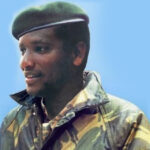The Guardian tells the story of Samuel Munyaneza, 45, and his wife Florence Uzamunkunda, 32, and their determination to end gender-based violence both in their home and their community.
The dramatic change in the couple’s life came after Samuel agreed to attend a gender-training programme in order to avoid being reported to law enforcers. Run by Rwanda Men’s Resource Centre (RWAMREC), a Kigali-based NGO and the only one of its kind in the country, the programme, popularly known as Positive Masculinities, focuses on sensitising men towards gender equality by challenging traditionally held notions.
In essence, the NGO’s approach is a reflection of the social renaissance that has swept the landlocked country in the last decade. Known primarily for its 1994 genocide, which saw more than 800,000 people killed and another 3.5 million displaced in fewer than 100 days, Rwanda is now quoted as a textbook example of women’s empowerment engineered through strong political will. In 2008, the small republic became the first and only country in the world to have majority female representation in its parliament at 56% – nearly double its 30% quota for women. In the September 2013 elections, the number went up to 64% – a feat largely credited to the women-friendly policies of the Rwandan president, Paul Kagame.


